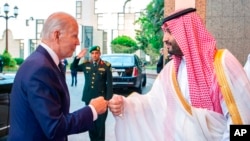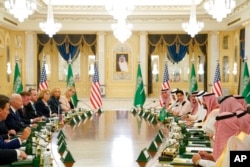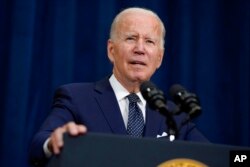President Joe Biden met Saudi King Salman and Crown Prince Mohammed bin Salman in Jeddah on Friday to bolster Israel's security against the threat of Iran and reassert U.S. influence in the Middle East, engaging a kingdom whose poor human rights record he has condemned in the past.
"We're not going to leave a vacuum in the Middle East for Russia or China to fill," Biden told reporters following his meeting with the Saudis. "And we're getting results."
Biden flew directly to Jeddah from Tel Aviv, hours after the kingdom announced the opening of its airspace, effectively ending the country's ban on flights to and from Israel. The gesture from Riyadh was part of a broader warming of relations between Israel and the Arab world as they align against Tehran.
"That is a big deal. A big deal," Biden said. "Not only symbolically but substantively, it's a big deal," he said, adding that he hoped the move would eventually lead to a broader normalization of Saudi-Israel relations. The two countries currently do not recognize each other.
Biden welcomed Saudi Arabia's extension of a nearly four-month-old U.N.-mediated truce in Yemen, and Riyadh's commitment to reach a wider settlement of the conflict that began in late 2014. The proxy war between a Saudi-led coalition and Tehran-backed Houthi militias has turned Yemen into a breeding ground for jihadi groups and killed more than 300,000 people.
"We discussed Saudi Arabia's security needs to defend the kingdom, given the very real threats from Iran and Iran's proxies," Biden said.
Biden also announced the withdrawal of multinational peacekeepers from Tiran Island in the Red Sea, effectively returning its control to Riyadh in an agreement that Washington facilitated among Saudi Arabia, Egypt and Israel. He characterized it as a historic deal that transforms a flashpoint "at the heart of Middle East wars into an area of peace."
Tiran and nearby Sanafir are uninhabited but strategically located islands at the mouth of the Gulf of Aqaba, which is bounded by Egypt, Saudi Arabia, Israel and Jordan. The islands have for decades been the source of conflict among the countries.
Peacekeepers, including American troops stationed in Tiran since 1978, will withdraw by the end of the year, allowing the area to be used for "tourism, development and peaceful pursuits," the White House said in a prepared statement.
Some have speculated that Israel's agreement to the transfer of Tiran to the Saudis may have facilitated the opening of Riyadh's airspace to Israeli planes.
"Or it may be just that that is an excuse for something that the crown prince wanted to do anyway," Jonathan Rynhold, head of the Political Studies Department at Bar-Ilan University, told VOA. "Either way, it was convenient."
Unlike King Salman, Crown Prince Mohammed bin Salman, often referred to by his initials MBS, has signaled openness in engaging with Israel.
The two countries are also discussing establishing direct flights from Israel to Jeddah for next year's Hajj, the Muslim pilgrimage. These small steps are important in fostering a different regional environment in the Middle East, said Brian Katulis, senior fellow and vice president of policy at the Middle East Institute.
"One that moves beyond the wars, conflict resolution and peacemaking phase and cracks open the door to a new, not yet fully realized phase: one of greater regional integration and normalization," Katulis told VOA.
No oil deal
Biden did not secure any announcement that could lower the price of oil, saying only that he and the Saudis had a "good discussion" on ensuring adequate oil supplies to support global economic growth.
"I'm doing all I can to increase the supply for the United States of America, which I expect to happen," Biden said.
His aides have said no details will be announced until next month's meetings of OPEC+, a group of 13 members of the Organization of Petroleum Exporting Countries and 10 other oil producers, including Russia.
"I don't think you should expect a particular announcement here bilaterally, because we believe any further action taken to ensure that there is sufficient energy to protect the health of the global economy will be done in the context of OPEC+," Jake Sullivan, Biden's national security adviser, said to reporters on the flight to Jeddah.
OPEC+ members are limited by production quotas agreed to in April 2020 at the start of the COVID-19 pandemic. An increase in output to offset price hikes triggered by the war in Ukraine would require unanimous agreement from the group, including from Moscow.
Biden also announced initiatives connecting Washington and Riyadh in areas including 5G technology, transition to renewable and clean energy, cybersecurity and space exploration.
Human rights
At the top of Biden's meeting with Crown Prince Mohammed and other Saudi royals, both sides ignored shouted questions from the U.S. press, including, "Is Saudi still a pariah?" and "Jamal Khashoggi — will you apologize to his family?"
U.S. intelligence has concluded that the crown prince approved the brutal murder of Khashoggi, a Saudi journalist and U.S. resident.
Biden, who during his presidential campaign said the kingdom should be treated as a pariah, told reporters he made his views on human rights and Khashoggi's murder "crystal clear" to the crown prince, who in turn claimed, according to Biden, that he "was not personally responsible for it."
"I indicated I thought he was," the president said he replied.
Biden's Saudi visit "came across as a slap" in the face of all those who stand for human rights, Agnès Callamard, secretary-general of Amnesty International, said in an interview with VOA.
"What President Biden is doing is suggesting that human rights are cheap and can be bargained out for a range of other impact," she said.
The last item on Biden's Middle East agenda on Saturday will be the GCC+3 Summit in Jeddah, with members of the Gulf Cooperation Council (Bahrain, Kuwait, Oman, Qatar, Saudi Arabia, United Arab Emirates) plus Egypt, Iraq and Jordan, where he will lay out his vision for U.S. engagement in the region.
Biden and summit leaders are expected to announce an agreement to connect Iraq's electric grid to the GCC's grids through Kuwait and Saudi Arabia, thus reducing Baghdad's dependence on Iran.
VOA's Margaret Besheer contributed to this report.










